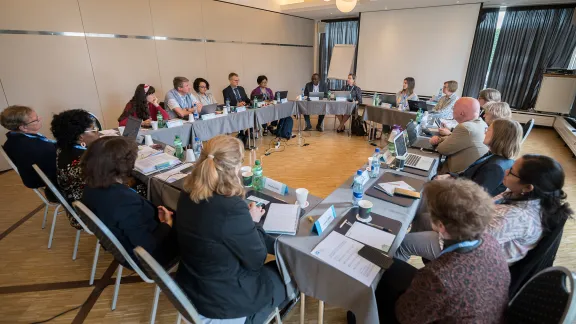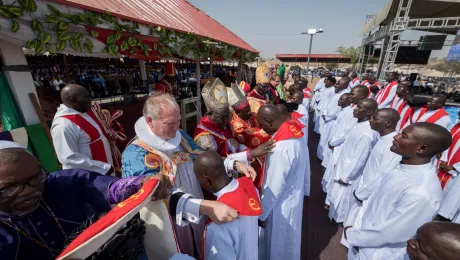
A session of the Committee for Communion Relations during the June 2024 LWF Council meeting at Chavannes-de-Bogis near Geneva, Switzerland. Photo: LWF/Albin Hillert
Council-appointed group will address church relationships, recognition of ministry, and constructive dialogue
(LWI) – The Lutheran World Federation (LWF) has established a Task Force on Mutual Responsibility. The working group will develop a framework for engagement among the member churches as they deepen their understanding and practices of communion relations.
The June 2024 Council-appointed task force will also define how churches intend to live into their shared commitments as member churches of the LWF, particularly in cases where mutual expectations are not met. The task force’s work considers LWF’s understanding of member churches as autonomous with their own decision-making authorities but also the 1990 Assembly decision to shift from a federation to a communion of churches.
The working group has four roles and responsibilities. It will elaborate how to foster respectful relationships among member churches and examine how their mutual relations are impacted by individual cross border cooperation, partnerships, and membership in different organizations and fellowships. It will also explore how member churches’ understanding of unity affects the mutual recognition of ministry as well as develop guidelines for engaging in respectful dialogues on potentially divisive issues.
With evolving relationships and challenges today, a framework is needed that brings a valued independence into relationship with mutual responsibility, which is also a mark of being church.
– Prof. Dr Dirk Lange, LWF Assistant General Secretary for Ecumenical Relations
“Unity in the church as understood by our Lutheran confessional writings, especially the Augsburg Confession, implies unity in faith and in the Holy Spirit, allowing for great diversity in practice,” affirmed Prof. Dr Dirk Lange, LWF Assistant General Secretary for Ecumenical Relations. “With evolving relationships and challenges today, a framework is needed that brings a valued independence into relationship with mutual responsibility, which is also a mark of being church,” he added.
The task force comprises seven members from the LWF’s seven regions. It also fulfills LWF's quota requirements. Members are lay, ordained, male, female and young theologians, specialists and experts with extensive experience in strengthening communion relations. The group will convene regularly online for content work and follow up with at least two in-person meetings, with support from LWF staff. They will report back to the LWF Council. The General Secretary will appoint the task force chairperson.


